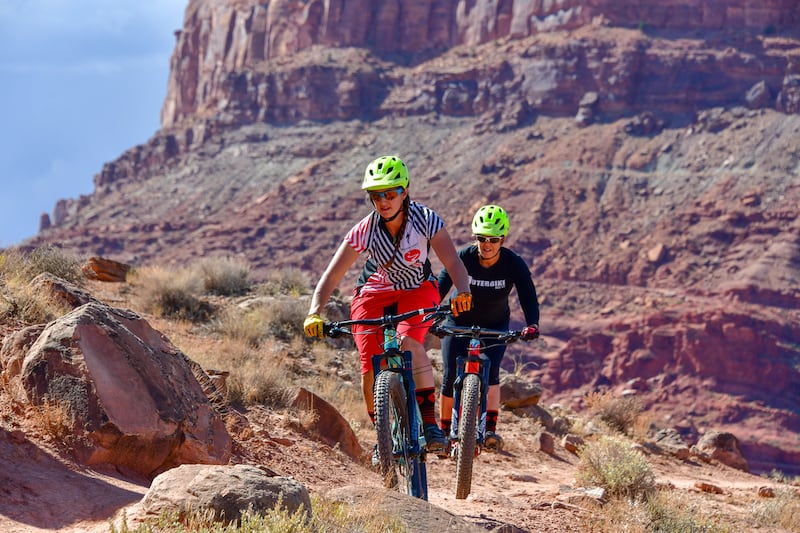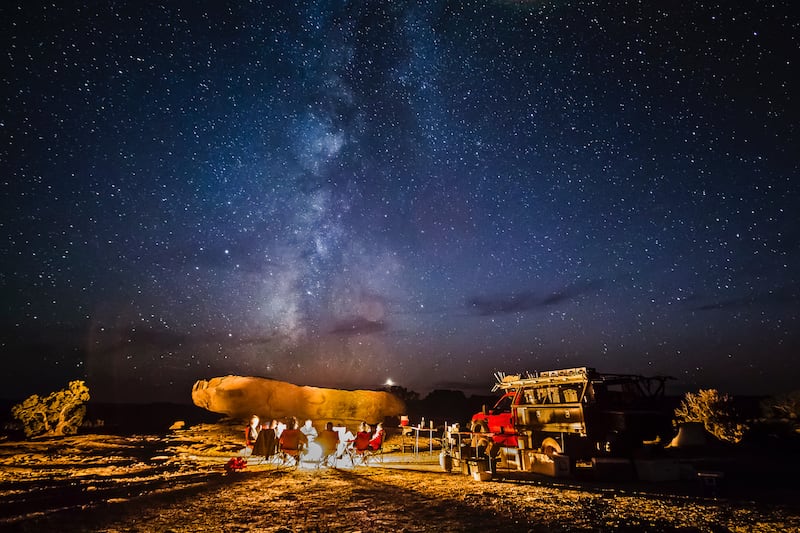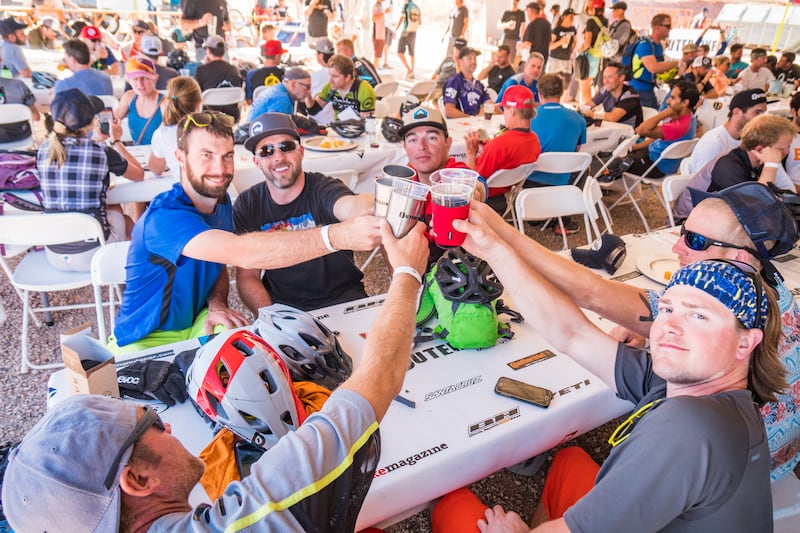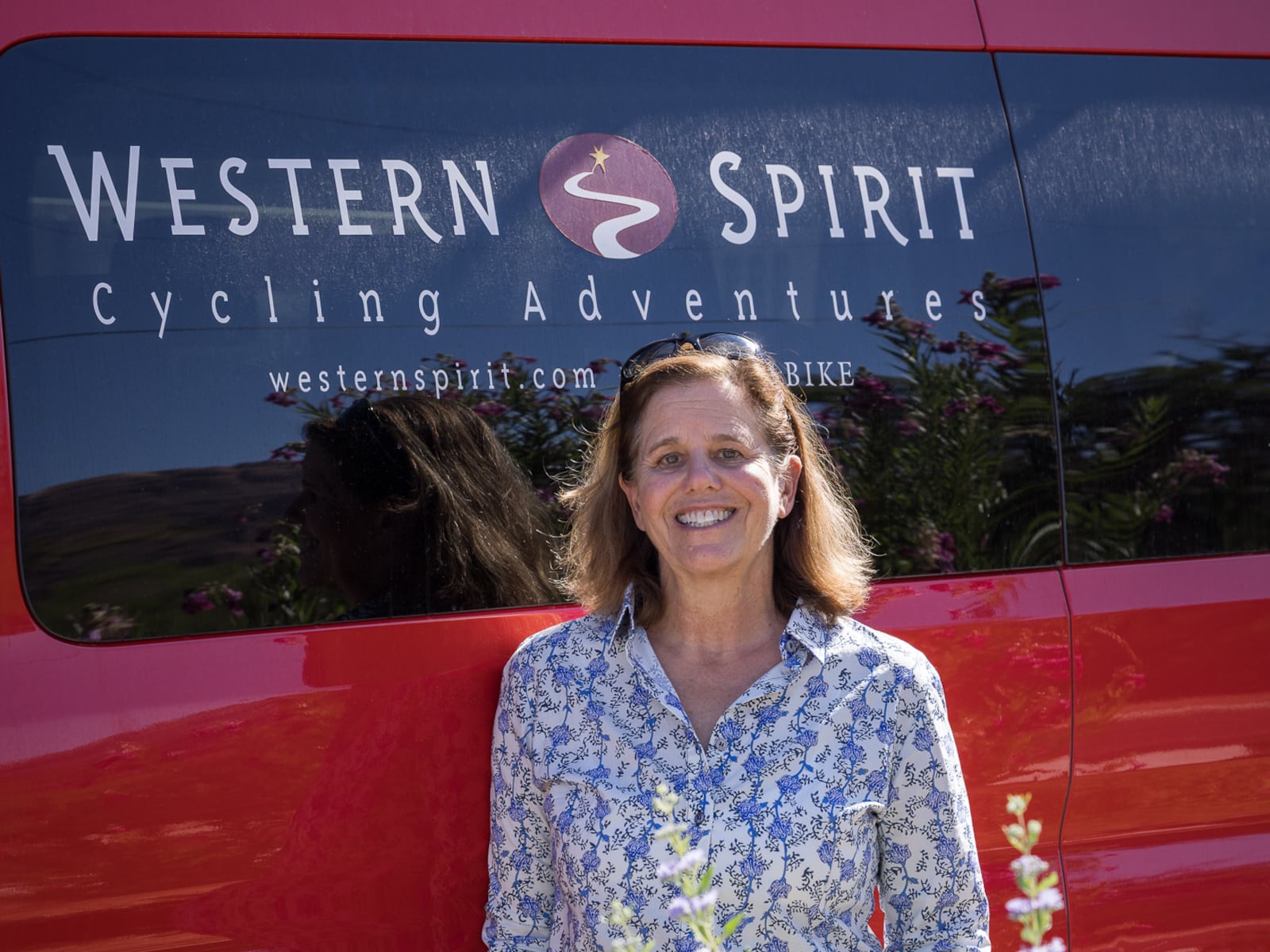Mountain biking is a young sport. The first mountain bikers scaled the trails of Mount Tamalpais in Marin County, California, in the 1970s, and by 1984, a little bike shop in Moab called Rim Cyclery was stocking its first mountain bikes, which the locals found worked pretty well on an old motorcycle route called the Slickrock Trail.
The sport was still in its infancy in 1990 when Ashley Korenblat joined the board of the fledgling International Mountain Biking Association (IMBA). Mountain bikers were still riding hiking trails, and hikers didn’t much like sharing. That’s when Korenblat, the 28-year-old CEO of a bike company called Merlin Metalworks, became a trailblazer. Literally.
“We had to prove the value of mountain biking, and to do that, we had to bring something to the party,” says Korenblat. “So we became trail-building experts. There was a big moment when we had this idea to put together trails crews [of] two people in a car with a bunch of tools driving all around, teaching and working with land managers to build better trails.”
Korenblat, whose pioneering work was recognized with her induction into the Mountain Biking Hall of Fame in 2003, has been blazing trails for mountain bikers ever since. Her Moab-based company Western Spirit Cycling Adventures runs more than 50 multi-day mountain biking trips, the nonprofit Public Land Solutions that she cofounded consults with communities across the West to build outdoor recreation economies, and the Outerbike consumer demo event she cofounded with her husband Mark Sevenoff will celebrate its 15th anniversary in October.
Korenblat deeply holds to a core belief that fuels Korenblat’s passion for leadership, which is about the life-enhancing benefits of being outdoors and in nature.
“When you see people come back from a Western Spirit trip, they look different,” Korenblat says. “And it’s not just the dirt or the sunburn. Anyone who’s spent time outside knows that you just feel better. It turns out that humans benefit from being in a natural setting.”
Along with being outdoors, these are a few of Korenblat’s favorite things — seeing riders return to camp on a Western Spirit trip with a deeper understanding of who owns the land they’re traversing; watching mountain bikers new to the sport fall in love with their next bike after an Outerbike demo ride on Moab’s famous trails; and seeing communities like Emery County, Utah, and Farmington, New Mexico, whose fates have been linked to the price of coal and natural gas, discover they can create economic value out of the outdoor activities they love doing most.
“The reason I feel like people tell us [Outerbike is] the greatest weekend ever is they have finally been invited to the party. Cycling, and a lot of sports, can be kind of cliquey if you’re not the cool kid, if you don’t know everything about everything.”
— Ashley Korenblat
“For me, after being a trail advocate and working on it from that angle, I just realized that there was a bigger argument,” she says. “Outdoor access is a mainstream economic driver.”
Cathy Ritter, former Colorado director of tourism, got to know Korenblat when Ritter’s consulting firm helped Grand County develop a strategic plan called Trail to Tomorrow. People kept telling her, “You have to talk to Ashley Korenblat.”
“I think the energy she pours into getting a mountain bike up a rocky path is the same level of energy she applies to everything,” says Ritter. “She doesn’t always move down the usual or expected path. She is able to look at things from different perspectives and really understand how new possibilities can be put into play to address long-time problems.”
The call of the entrepreneurial life
Korenblat arrived in Moab by way of Wall Street and Boston. She took a job out of business school trading international bonds, and she knew pretty quickly that this kind of life was never going to work for her. She was an entrepreneur who lived for the outdoors, and here she was in the concrete canyons of New York making money for someone else under the fluorescent lights of the First Boston trading floor.
She became a CEO at age 27 when the owner of Boston-based Merlin Metalworks showed her to a factory floor littered with titanium tubing and told her the rules: “Just don’t lose money.”
Under her leadership, Merlin became the premier maker of titanium bikes, which were considered the best in the world by pro cyclists, including a customer named Lance Armstrong. They were also the most expensive in the world. Korenblat says customers would “eat ramen for months” to save the money needed to buy them.
At one point, when demand pushed wait times to eight months, she found herself on the phone, telling Tour de France winner Greg LeMond that yes, she could find him a bike but forget about getting a pro deal. He’d have to pay full price, and he gladly did.
“There is a certain risk curve you have to be comfortable with to be an entrepreneur, or really a leader in any situation, because you have to be able to lean into your convictions — like titanium is better than carbon fiber,” says Korenblat. “I’ve had friends who have been in corporate jobs, and they say they want to start their own business. I tell them, you either are comfortable with the risk — welcome to the cash-flow rollercoaster — or it’s going to make you nauseous.”
Korenblat grew Merlin for six years, and then in 1995, the company was sold.
As she, in her words, “took a moment to free float in the universe,” Korenblat traveled to Moab with friends and took a mountain biking trip with a small outfitter called Western Spirit Cycling Adventures. She got to know the owner.
“For him, a day in the office was a bad day,” Korenblat remembers. “He was only into the outside part of the job, and I was fine with the office part.”
She loved the Moab trails and the prospect of camping in national parks so much, she bought Western Spirit in 1997 and moved to Utah. She met her husband Mark Sevenoff, an accomplished mountain biker, and their early analysis found that customers wanted to come back and try new trips. So she and Sevenoff spent the early years of their marriage traveling to public lands across the West, mapping out new routes.

Korenblat developed a unique type of expertise that would set the stage for the rest of her career. She explains: “Because our trips cross so many jurisdictions — I mean, for some of our trips, we need 10 permits — we work with county, state, park, forest, Bureau of Land Management. You name a type of land, and we’ve worked with that type of land management.”
Western Spirit today ranks among the country’s largest holders of recreational permits for public lands.
That expertise led IMBA to hire her in 2010 to lead its Public Lands Initiative, and Korenblat worked with Congress to write, negotiate and pass 28 wilderness bills that extended or protected 3,000 miles of trails for mountain biking. Working on legislation was eye-opening.
“You don’t have to make everyone perfectly happy,” Korenblat says. “If everyone gets to 85 percent, they’re going to stay involved in the bill and they start to get attached to the benefits that are going to happen if the bill passes.”
Public Land Solutions — the economics of outdoor recreation
By the time her work for IMBA ended, Korenblat could see change coming to communities across the West.
In places like Emery County and Farmington, places that relied on oil and gas wells and coal-fired power plants to provide good jobs, energy operations were shrinking. Korenblat saw an opportunity to help communities diversify their economies. In 2012, she teamed with a Moab attorney, Jason Keith, an ultra trail runner with experience working on public policy, and they launched a non-profit consultancy called Public Land Solutions.
“Most of the communities we go into have already seen the writing on the wall and they’re ready to start planning for the future,” Korenblat says. “The question is, what’s going to bring revenue into the community in 5, 10, 20 years? And what can we do today to prepare for that?”
When Nate Duckett was elected mayor of Farmington, New Mexico, in 2018, he inherited a shrinking economy. The Four Corners city had two coal power plants that were reducing shifts, and big oil and gas companies were leaving for the Permian Basin in western Texas and the Marcellus Shale in western Pennsylvania.
“We had seen some of the big dogs like Conoco Phillips, Weatherford, Halliburton, BP, big energy companies slowly [exiting] the San Juan Basin,” Duckett says. “We have tons of gas. They say we’re the Saudi Arabia of the United States down here. But it’s natural gas. So if the price isn’t four bucks, nobody’s making any money. … Talking to business owners in the city, they were pretty depressed.”
Duckett ran for mayor with a priority of diversifying the Farmington economy. When Korenblat heard Farmington’s story and figured out that the initiative’s success would be dependent on building a strong working relationship with the Bureau of Land Management (BLM), she reached out.
“[Public Land Solutions] came in and did community meetings,” Duckett says. “They asked the community what they wanted to see as far as outdoor recreation goes. Then they went out and did an inventory of all of our trails and recreation assets. In my opinion, it helped kick off the public engagement component [that] you really need to get buy-in.”
Ultimately, that buy-in helped Farmington residents, in Duckett’s words, “find the will to fund our future.” Residents passed a quarter-percent tax to fund the initiative, and Duckett hired the city’s first director of the Outdoor Recreation Industry Initiative and Economic Development.

Having a clear roadmap has enabled Farmington to win $170 million in federal and state grants, according to Duckett. Among other things, these grants helped develop:
- Trails along the Animas and San Juan Rivers, including a new boat ramp, which encouraged the start-up of two new river rafting businesses.
- Nearly 50 miles of new mountain biking trails and a new pump track and skills park.
- A reservoir previously off limits to residents opened with fishing, boating and a beach for swimming.
- A river walk that connects downtown to the Animas River, where a remarkable new surfing feature called River Wave opened in June.
Duckett credits Korenblat’s experience and network within the BLM for helping Farmington build relationships with public land managers. The work has paid off, according to Duckett, who says that in 2024, Farmington saw the biggest year-to-year growth in gross receipt tax revenue in its history, surpassing budgeted revenue by almost $6 million.
“It’s not just about attracting visitors,” Korenblat says. “It’s also about attracting business investment because so many companies and professionals can locate wherever they choose. Why do you think you can have 20 different kinds of surgery in Moab, Utah, right now? It’s because the doctors want to come and live here. And it’s going to happen in Richfield and Price and lots of other communities because it turns out humans want to get outside.”
Blazing trails in Moab
Korenblat has also been a force of nature closer to home in Moab. She’s in her first year as president of the Moab Chamber of Commerce, which means she’s leading conversations about how to address the traffic and noise that comes with growth. But when she first moved to Moab in 1997, it wasn’t the mountain biking hotbed it is today.
“It was a place that had potential,” Korenblat says, “but it was a bunch of resource extraction roads.”
In 1999, Moab civic leaders teamed with Korenblat and other community leaders to form Trail Mix, a committee sponsored by Grand County that after seven years of public meetings released a master plan in 2007. The plan launched the development of the 150 miles of non-motorized singletrack trails that have made Moab the mountain biking mecca it is today.
In Trail Mix meetings, Korenblat could feel the momentum building. In 2003, she raised money from Moab businesses to start the Moab Trails Alliance, a nonprofit that would make sure new trails got built the right way and in cooperation with key land managers and user groups beyond bikers.
“That management plan, that’s how you play this game,” Korenblat says. “You get involved in the planning, and you look at what the future needs are going to be, and you work with your land manager and your county to get them.”
In 2010, she founded Outerbike with Sevenoff, and that created an annual flow of riders to Moab. Sevenoff readily credits Korenblat with conceiving the idea on the way home from the Interbike bicycle industry trade show in Las Vegas. What if, she wondered out loud, the bike companies could take these big demo fleets to Moab and consumers could test-ride bikes on real trails?
Today, Outerbike is preparing for its 15th birthday party. On October 3, as has become tradition, ticket holders will line up at the gate and sprint to the bikes they want to demo first, and then shuttles will run riders and their chosen demo bikes to Moab’s finest trails.

Jordan Washburn, director of sales, marketing, and experience for Lindon-based Ari Bikes, says Outerbike is especially critical for direct-to-consumer brands like his.
“It gets you that much closer to customers,” Washburn says. “We have the mantra: More butts on bikes. If we can get more people just to swing a leg over our product and try it, it closes the deal. … Overall, it’s a really positive community, positive vibes.”
That vibe is by design. Korenblat remembers people calling her crazy for investing $10,000 on heavy-duty tablecloths for the first Outerbike. She says she wanted to create a VIP tent experience that created community — where bikers new to the sport get to sit next to a bike company technician or a pro mountain biker who had just led a group tour.
“The reason I feel like people tell us it’s the greatest weekend ever is they have finally been invited to the party,” Korenblat says. “Cycling, and a lot of sports, can be kind of cliquey if you’re not the cool kid, if you don’t know everything about everything.”
Perhaps one of her greatest leadership feats came in 2020 when she led the charge to save Moab’s world-famous Slickrock Trail. It started with an article in The New Yorker that said a private out-of-state buyer named Craig Larson was bidding to lease a large swath of BLM public land between Canyonlands and Interstate 70. The BLM planned to auction off the lease.
Korenblat went to work, gathering details of the potential sale from her contacts and educating local officials and Governor Herbert’s office about what Utah stood to lose if the purchase went through, including the beloved Slickrock Trail. IMBA and the Outdoor Recreation Alliance joined forces to raise public awareness.
Korenblat remembers calling the governor’s office, saying, “If Governor Herbert really believes leasing 120,000 acres to someone named Craig is good for Moab, he needs to stand up and say that.”
Two days later, the auction was canceled. Korenblat, ever the pragmatic leader, says, “That’s the way democracy should work. If you let everybody who cares speak up, you’re going to learn a lot.”

